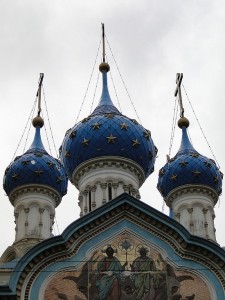Past choices bring consequences, for individuals and for nations. Our past choices, for example, limit us in the help we can offer the uprising against the Syrian dictator Bashar al-Assad. Thousands of men, women, and children have died in brutal circumstances. Tens of thousands more have fled and become refugees.
 The issue of chemical weapons hovers over the conflict. Bashar al-Assad has chemical weapons and has threatened to use them. No one doubts the brutality of the al-Assad famly. The father of Bashar massacred and obliterated the village of Hama in 1982 because of its opposition to his rule.
The issue of chemical weapons hovers over the conflict. Bashar al-Assad has chemical weapons and has threatened to use them. No one doubts the brutality of the al-Assad famly. The father of Bashar massacred and obliterated the village of Hama in 1982 because of its opposition to his rule.
We can choose to send weapons to the Syrian opposition, but the opposition is fractured. It includes extremists like al-Qaeda. How can we be sure who is receiving the weapons? The opposition is fluid: groups frequently change alliances.
Our entry into Afghanistan and then Iraq after 9/11 wearied us and taught us the limitations and the costs of military involvement. Our actions in Iraq lost us good will among the Arab nations when no weapons of mass destruction were found there, which we gave as our reason for entry to that country. Whether true or not, other nations now assume that any move we make in the area is because we want the oil and has nothing to do with compassion for the Syrians or anyone else.
Our support for dictators in the Middle East haunts us. We supported them because they kept a lid on Islamist regimes, at the same time becoming both corrupt and brutal to their own people. Now that dictators in Tunisia and Egypt have been overthrown, the new government leaders remember our support for the dictators who sometimes tortured them.
 Decades ago, in 1973, oil producing nations began an oil embargo against the United States because of our support for Israel. Gas prices soared. U.S. President Richard Nixon led the nation in measures to reduce our oil consumption. We talked glibly of loosening our dependence on oil in the Middle East. Once the crisis passed, we chose to return to business as usual, willing to pay a higher price at the pump. Eventually we paid on 9/ll and in Afghanistan and in Iraq.
Decades ago, in 1973, oil producing nations began an oil embargo against the United States because of our support for Israel. Gas prices soared. U.S. President Richard Nixon led the nation in measures to reduce our oil consumption. We talked glibly of loosening our dependence on oil in the Middle East. Once the crisis passed, we chose to return to business as usual, willing to pay a higher price at the pump. Eventually we paid on 9/ll and in Afghanistan and in Iraq.
Our desire for the oil of the Middle East has driven much of our foreign policy in the region since the Second World War. We are reaping the results of those policies.



 The situation has improved for Christians of the Orthodox persuasion. In fact, Russian President Vladimir Putin stands accused of using the Russian Orthodox church as a means of bolstering his less than democratic regime. Some Russians are concerned by the power the church appears to be gaining in Putin’s government. Reports suggest that the church’s influence may be one reason for Russia’s support of the bloody Assad regime in Syria.
The situation has improved for Christians of the Orthodox persuasion. In fact, Russian President Vladimir Putin stands accused of using the Russian Orthodox church as a means of bolstering his less than democratic regime. Some Russians are concerned by the power the church appears to be gaining in Putin’s government. Reports suggest that the church’s influence may be one reason for Russia’s support of the bloody Assad regime in Syria. Syria is Russia’s remaining ally in the Middle East and hosts a Russian naval base. The church, rightly, is concerned about the fate of their fellow Orthodox believers in Syria should the Assad regime fall and be replaced by a possibly Islamist government. However, to suggest that Assad should be allowed to slaughter innocent civilians so that Christians might—possibly—be better protected, seems contrary to Jesus’ teachings, to say the least.
Syria is Russia’s remaining ally in the Middle East and hosts a Russian naval base. The church, rightly, is concerned about the fate of their fellow Orthodox believers in Syria should the Assad regime fall and be replaced by a possibly Islamist government. However, to suggest that Assad should be allowed to slaughter innocent civilians so that Christians might—possibly—be better protected, seems contrary to Jesus’ teachings, to say the least.